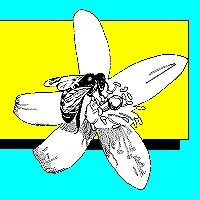APIS Volume 4, Number 2, February 1986

In this issue
- Liability Insurance--How Much is Enough; Observations on the State of this Most Necessary Commodity
LIABILITY INSURANCE:HOW MUCH IS ENOUGH?
At the recent meeting of the American Beekeeping Federation in Phoenix, Arizona the maelstrom concerning tracheal mite regulations took the spotlight. Under the surface, however, a fundamental and perhaps more potentially dangerous situation reared its head. The current liability insurance climate as it affects those who sell natural products of the hive, run businesses involving employee actions and/or keep insects that sting must be squarely confronted.
One example is potential liability because honey can easily become contaminated with botulism spores. Dr. C.N. Huhtanen, Microbiologist at the USDA/ARS laboratory in Philadelphia discussed the infant botulism problem in detail. Although Dr. Huhtanen provided an overview of the situation and some encouraging comments, there still exists a great deal of controversy over this issue. Pertinent questions that remain are:
- Why are breast-fed infants more susceptible to infant botulism?
- How does honey become contaminated? Through contact with dust, wind, bees, and pollen?
- What is the best method to detect spores?
- Can honey be somehow sterilized or certified free of spores?
Although answers are not available, food companies and others are addressing the potential liability issue with printed material. A resolution presented to the membership asked that the Federation help finance one educational poster to be issued by Ross Laboratories, Inc. which tells parents not to feed honey to infants under one-year old. A powerful reason for this would be to show "good faith" in any liability case that might be brought against a producer or packer implicated in an infant botulism case.
[Editor's Note 5/11/1997--The National Honey Board has looked carefully into the infant botulism thing and has published a "White Paper" on this issue.]
Later in the program the question of beekeeper liability in selling other products, particularly pollen, was addressed. Legal experts present indicated that if the product was properly labelled and that no claims about nutritional or medicinal value were provided, liability might be limited, but that the sale of any commodity always constituted some risk.
The program also featured Linda Ferguson, Manager of Mass Marketing, Great American Insurance Co., Minneapolis, MN who discussed "Planning to Avoid Liability Insurance Problems." She suggested everyone analyze his/her chances of being sued within the context of either contracts or torts. The former are "promises" made or implied, while the latter refer to legal wrongs such as false arrest, eviction, assault and/or battery. She suggested all pollination and site contracts be in writing and read carefully before being signed. Beyond this, however, many other agreements, including those implied when selling products, are often construed as contracts by the courts, and subject to liability claims.
Torts may encompass any number of things, including the number one cause of liability cases, slips and falls. Ms. Ferguson suggested using common sense around the beekeeping operation and at home to patch cracks in sidewalks, mop up puddles, and clean slick areas (honey spills); this kind of prevention will go a long way to avoid accidents and subsequent liability suits. Use of vehicles is also a problem area, she said. They should be well maintained and employers should remember that accidents involving vehicles driven by employees, who are viewed as acting on behalf of the employer, renders the employer liable.
There are other ways potential liability is incurred, according to Ms. Ferguson. Inviting tour groups into an operation calls for a great deal of planning, especially if children are involved. Machines and moving parts are often attractive to children (7 to 12 years old in most states) and should always be viewed as potentailly dangerous to their health. There is also a body of law surrounding so-called "attractive nuisances," which can cause liability problems. The classic case, she said, concerns a child being attracted to a unfenced swimming pool and drowning, rendering the owner liable.
Keeping and managing an insect that stings may create a situation ripe for potential suits. Again, to show good faith, Ms. Ferguson suggested bee yards be labelled (beehives could be construed as an attractive nuisance), fenced and identified with name, address and phone number of the owner. In addition, neighbors should be notified where bees are located, especially in well travelled and urban areas. This no doubt will become increasingly important as more and more information about Africanized honey bees reaches the public. Bees can also trespass, defined as "any unauthorized entry onto the property of another by some physical, tangible agency, either person or thing."
A topic not mentioned by Ms. Ferguson, but which cannot be ignored is potential liability for pesticide use. Beyond statutory or regulatory violations (not using a chemical according to the label) users may also be liable in a common law action, or "lawsuit," according to authors of Florida Cooperative Extension Bulletin 212, Regulations Governing the Use of Agricultural Pesticides. Four possible areas include: trespass (yes, even pesticides can legally trespass), nuisance (private or public), negligence or strict liability.
The latter results from ultra-hazardous activities. Again according to Bulletin 212, "so exceptional, non-natural or abnormally dangerous that the actors must be held strictly liable for any resulting injury, regardless of whether the actors were negligent or exercised due care." Specific examples of activities include keeping wild animals (are honey bees wild?), and carrying or storing explosives or dangerous chemicals (pesticides). Further information on federal regulations concerning pesticide use, as well as Florida's Right To Know Law, was published in the August 1985 issue of APIS. The inevitable question at the Federation meeting was how much liability insurance should beekeepers have? There was no specific answer, although Ms. Ferguson suggested that at least the amount equivalent to one's assets should be carried. It all depends on the risk one is willing to take. Perhaps a better question, at least during the rest of the 1980s may well be how much will one be able to purchase.
A nationwide crisis exists in liability insurance. That's the message of cover stories in the January issue of Agrichemical Age and the January 27 issue of U.S. News and World Report. An example of the problem is the inability of a chain of ice skating rinks owned by Charles Schulz, creator of "Peanuts," to obtain liability insurance.
Changes in law and society are behind the current liability insurance crisis, according to U.S. News and World Report:
"No longer is the decisive question whether the party sued--the defendant--negligently harmed someone. The question now centers on how much the plaintiff ought to be compensated for injuries. Judges constantly expand 'common law' to create new grounds for suits, and citizens in a more impersonal world look to the courts to solve problems. They are aided by a corps of 700,000 lawyers--roughly 1 for every 350 Americans--who collect some $55 billion a year in fees. The spread of liability insurance also has led to a mind-set that no one really gets hurt by the barrage of suits since insurers will pick up the bill.
Agrichemical Age quotes several knowledgeable persons in the agribusiness community. "It's a mess right now, mostly in liability coverage...The most dramatic changes in the history of commercial general liability insurance will go into effect on Jan. 1, 1986...It's almost possible to get coverage and our current broker has a moratorium on writing anything new..The pest control operators are being canceled right and left."
One reason for the crisis is the extremely high amounts awarded in damage suits. According to U.S. News and World Report , "A seriously injured California gymnast wins $14.7 million in a suit against an exercise-mat manufacturer...Half of the 10 doctors doing obstetrics work in Montrose, Colorado stop delivering babies when insurance rates soar...A New Jersey couple must pay $72,500 to a woman hurt when a man who had been drinking at the couple's home smashes his truck into her car...a farmer cancels a live Nativity scene when an insurer asks a $540 premium in case someone is injured by a donkey and horses carrying Mary and the Wise Men."
Other factors also contribute. New court interpretations are causing second thoughts by insurers, as are successful efforts by attorneys to include in liability cases firms and others who are perceived as having insurance and, therefore, are more capable of paying, the so-called "deep pocket" suit. In addition many insurance companies are in financial trouble; they also depend a great deal on reinsurers who have withdrawn from the market.
According to Agrichemical Age,
"The reinsurance companies are in the driver's seat, followed by the insurance company that sells your policy. You're at the end of the rope. Your best bet is to run a tight ship. Even then, coverage may not be obtainable, at least for 1986."
The liability insurance situation is murky at best, but it appears that the future calls for an increase in liability suits on all fronts. The beekeeper must place him or herself in a high-risk category for a number of reasons, but particularly because of potential stinging incidents. It will behoove him/her to be the best of all possible neighbors and to continually show "good faith" in dealing with the public.
Sincerely,
Malcolm T. Sanford
Bldg 970, Box 110620
University of Florida
Gainesville, FL 32611-0620
Phone (352) 392-1801, Ext. 143 FAX: (352)-392-0190
http://www.ifas.ufl.edu/~mts/apishtm/apis.htm
INTERNET Address: MTS@GNV.IFAS.UFL.EDU
©1986 M.T. Sanford "All Rights Reserved























